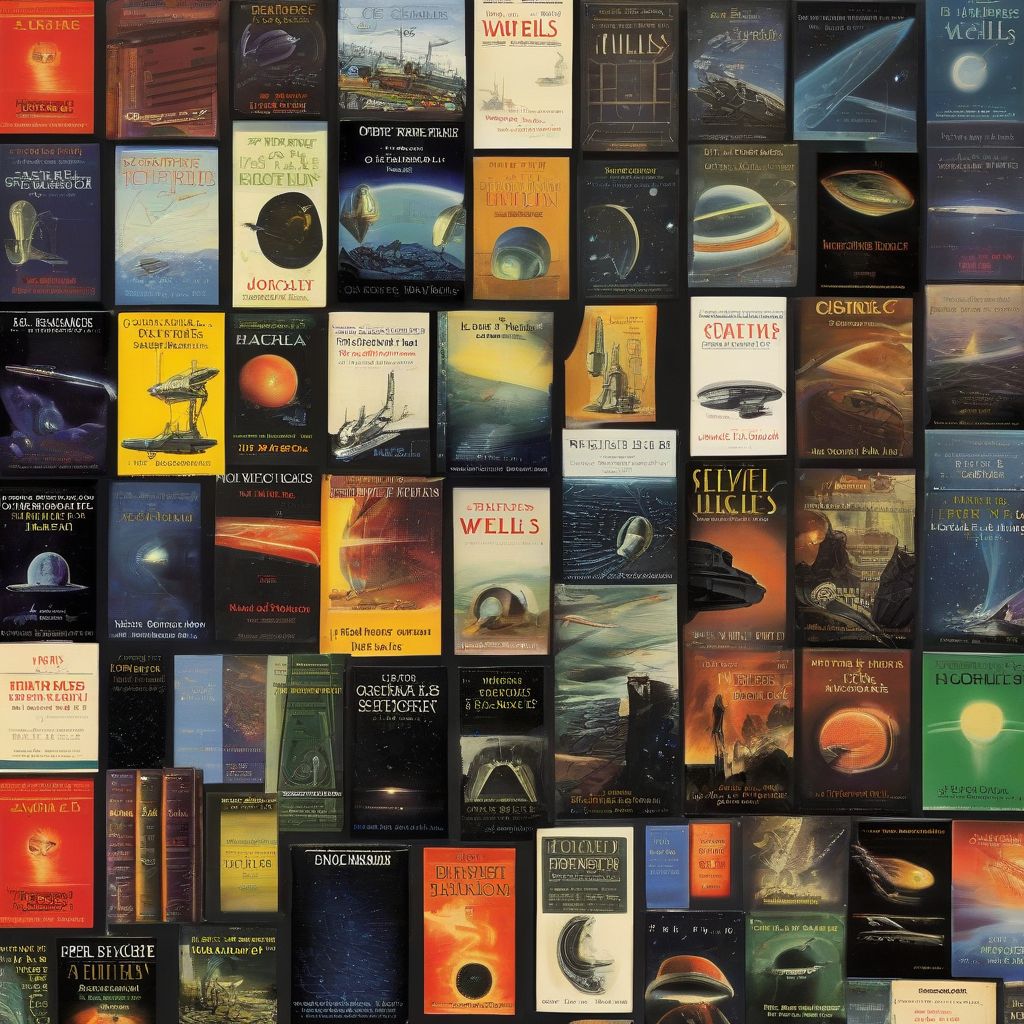Imagine a world where technology has advanced beyond our wildest dreams, where humans have colonized distant planets, and where artificial intelligence has surpassed our own. This is the world that science fiction authors invite us to explore, pushing the boundaries of our imagination and challenging us to think about the future.
But who are the masterminds behind these incredible stories? Who shaped the landscape of science fiction into what we know and love today? Let’s delve into the fascinating world of some of the most influential science fiction authors, whose visionary works have captivated generations and continue to inspire us today.
Pioneering Legends of Science Fiction
No exploration of science fiction would be complete without acknowledging the founding pillars of the genre. These authors didn’t just tell stories; they built the very foundation of science fiction:
Mary Shelley: Birthing the Genre
Often hailed as the mother of science fiction, Mary Shelley’s Frankenstein (1818) wasn’t just a horror story. It was a profound exploration of scientific ambition and its ethical implications, themes that still resonate deeply today. Shelley’s masterpiece gave birth to the concept of the “mad scientist” and explored the potential consequences of unchecked technological advancements.
H.G. Wells: The Visionary Time Traveler
H.G. Wells, a prolific writer of the late 19th and early 20th centuries, gifted us with timeless classics that remain eerily relevant even now. The Time Machine (1895) wasn’t just a thrilling adventure through time; it was a stark commentary on social inequality and the potential pitfalls of unchecked scientific progress. The War of the Worlds (1898) presented a terrifyingly realistic depiction of an alien invasion, igniting our collective fear and fascination with extraterrestrial life.
 H.G. Wells Books
H.G. Wells Books
Jules Verne: Journey to the Center of Imagination
Jules Verne, a contemporary of Wells, captivated readers with his tales of incredible adventures fueled by scientific innovation. Journey to the Center of the Earth (1864) and Twenty Thousand Leagues Under the Sea (1870) weren’t just exciting voyages into the unknown; they were testaments to human ingenuity and the thirst for exploration. Verne’s works inspired generations of scientists and inventors with their optimistic view of the potential of science.
Shaping the Golden Age of Science Fiction
The Golden Age of Science Fiction, roughly spanning from the 1940s to the 1960s, witnessed an explosion of creativity and innovation. Authors during this period grappled with the social and technological changes of their time, exploring themes of artificial intelligence, space exploration, and the nature of humanity:
Isaac Asimov: Architect of the Future
Isaac Asimov, a biochemistry professor turned prolific writer, is arguably one of the most influential figures of the Golden Age. His Foundation series, spanning multiple novels and short stories, presented a complex and thought-provoking vision of a vast galactic empire and the intricate workings of psychohistory, a fictional science that predicts the future. Asimov’s Robot series, exploring the ethical dilemmas of artificial intelligence, gave us the Three Laws of Robotics, a set of rules designed to guide the development and interaction between humans and robots, concepts that are increasingly relevant today.
Robert Heinlein: Probing the Human Condition
Robert Heinlein, another giant of the Golden Age, challenged readers with his socially conscious and often controversial stories. Starship Troopers (1959), a military science fiction novel, sparked intense debates about war, duty, and the nature of citizenship. Stranger in a Strange Land (1961), a groundbreaking work exploring themes of free love, social alienation, and religious experience, became a countercultural classic.
Arthur C. Clarke: The Prophet of the Space Age
Arthur C. Clarke, known for his scientifically rigorous and awe-inspiring stories, captured the wonder of space exploration like no other. 2001: A Space Odyssey (1968), written in collaboration with Stanley Kubrick for the iconic film, expanded our understanding of humanity’s place in the universe. Clarke’s works, often infused with a sense of cosmic wonder, ignited the imaginations of millions and inspired a generation to look to the stars.
New Wave and Beyond: Pushing the Boundaries
The New Wave movement in science fiction, emerging in the 1960s and 1970s, challenged established norms and pushed the boundaries of the genre. These authors explored experimental writing styles, delved into more literary and psychological themes, and weren’t afraid to tackle controversial social issues:
Ursula K. Le Guin: Champion of Social Justice
Ursula K. Le Guin, a master of world-building and allegorical storytelling, used science fiction as a powerful tool to explore themes of gender, social justice, and environmentalism. The Left Hand of Darkness (1969), set on a planet where individuals have no fixed gender, challenged traditional notions of gender and sexuality. The Dispossessed (1974), a complex exploration of anarchist and capitalist societies, questioned the very foundations of power and control.
Philip K. Dick: Questioning Reality Itself
Philip K. Dick, a master of dystopian fiction and philosophical exploration, forced readers to confront unsettling questions about the nature of reality and identity. Do Androids Dream of Electric Sheep? (1968), the basis for the cult classic film Blade Runner, blurred the lines between humans and artificial beings, raising profound questions about what it means to be human. Dick’s works, often exploring themes of paranoia, altered states of consciousness, and the fragility of reality, continue to inspire filmmakers and writers today.
[amazon bestseller=”science fiction”]
Octavia Butler: Amplifying Marginalized Voices
Octavia Butler, a visionary author who broke down barriers in the predominantly white and male-dominated world of science fiction, gave voice to marginalized communities and explored themes of race, power, and social change through her powerful writing. Kindred (1979), a haunting and unforgettable tale of time travel and slavery, forced readers to confront the brutal realities of America’s past. Butler’s work continues to resonate with readers today, inspiring new generations of writers and readers from diverse backgrounds.
The Legacy and Future of Science Fiction
The science fiction authors we’ve explored are just a glimpse into the vast and ever-evolving world of this captivating genre. Their works have not only entertained and inspired generations but have also served as a powerful lens through which to examine our own world, our values, and our place in the universe.
What makes these authors so influential? They dared to imagine the unimaginable, to push the boundaries of what we thought was possible. They challenged us to think critically about the future, to consider the consequences of our actions, and to embrace the power of our own imagination.
As technology continues to advance at an unprecedented pace, science fiction remains as relevant as ever. New authors are emerging, pushing the boundaries of the genre even further, exploring themes of climate change, biotechnology, and the increasing role of technology in our lives.
Whether you’re a long-time fan of science fiction or a curious newcomer, I encourage you to explore the works of these influential authors. You might be surprised at how their stories resonate with you, challenge your assumptions, and ignite your own imagination. Who knows what incredible worlds you’ll discover?
What are your favorite science fiction books or authors? Share your thoughts and recommendations in the comments below!
